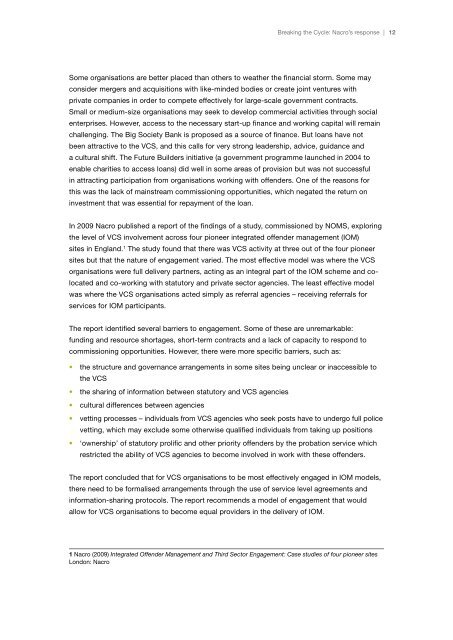Nacro's response to Breaking the Cycle Green Paper
Nacro's response to Breaking the Cycle Green Paper
Nacro's response to Breaking the Cycle Green Paper
You also want an ePaper? Increase the reach of your titles
YUMPU automatically turns print PDFs into web optimized ePapers that Google loves.
<strong>Breaking</strong> <strong>the</strong> <strong>Cycle</strong>: Nacro’s <strong>response</strong> | 12Some organisations are better placed than o<strong>the</strong>rs <strong>to</strong> wea<strong>the</strong>r <strong>the</strong> financial s<strong>to</strong>rm. Some mayconsider mergers and acquisitions with like-minded bodies or create joint ventures withprivate companies in order <strong>to</strong> compete effectively for large-scale government contracts.Small or medium-size organisations may seek <strong>to</strong> develop commercial activities through socialenterprises. However, access <strong>to</strong> <strong>the</strong> necessary start-up finance and working capital will remainchallenging. The Big Society Bank is proposed as a source of finance. But loans have notbeen attractive <strong>to</strong> <strong>the</strong> VCS, and this calls for very strong leadership, advice, guidance anda cultural shift. The Future Builders initiative (a government programme launched in 2004 <strong>to</strong>enable charities <strong>to</strong> access loans) did well in some areas of provision but was not successfulin attracting participation from organisations working with offenders. One of <strong>the</strong> reasons forthis was <strong>the</strong> lack of mainstream commissioning opportunities, which negated <strong>the</strong> return oninvestment that was essential for repayment of <strong>the</strong> loan.In 2009 Nacro published a report of <strong>the</strong> findings of a study, commissioned by NOMS, exploring<strong>the</strong> level of VCS involvement across four pioneer integrated offender management (IOM)sites in England. The study found that <strong>the</strong>re was VCS activity at three out of <strong>the</strong> four pioneersites but that <strong>the</strong> nature of engagement varied. The most effective model was where <strong>the</strong> VCSorganisations were full delivery partners, acting as an integral part of <strong>the</strong> IOM scheme and colocatedand co-working with statu<strong>to</strong>ry and private sec<strong>to</strong>r agencies. The least effective modelwas where <strong>the</strong> VCS organisations acted simply as referral agencies – receiving referrals forservices for IOM participants.The report identified several barriers <strong>to</strong> engagement. Some of <strong>the</strong>se are unremarkable:funding and resource shortages, short-term contracts and a lack of capacity <strong>to</strong> respond <strong>to</strong>commissioning opportunities. However, <strong>the</strong>re were more specific barriers, such as:• <strong>the</strong> structure and governance arrangements in some sites being unclear or inaccessible <strong>to</strong><strong>the</strong> VCS• <strong>the</strong> sharing of information between statu<strong>to</strong>ry and VCS agencies• cultural differences between agencies• vetting processes – individuals from VCS agencies who seek posts have <strong>to</strong> undergo full policevetting, which may exclude some o<strong>the</strong>rwise qualified individuals from taking up positions• ‘ownership’ of statu<strong>to</strong>ry prolific and o<strong>the</strong>r priority offenders by <strong>the</strong> probation service whichrestricted <strong>the</strong> ability of VCS agencies <strong>to</strong> become involved in work with <strong>the</strong>se offenders.The report concluded that for VCS organisations <strong>to</strong> be most effectively engaged in IOM models,<strong>the</strong>re need <strong>to</strong> be formalised arrangements through <strong>the</strong> use of service level agreements andinformation-sharing pro<strong>to</strong>cols. The report recommends a model of engagement that wouldallow for VCS organisations <strong>to</strong> become equal providers in <strong>the</strong> delivery of IOM. Nacro (2009) Integrated Offender Management and Third Sec<strong>to</strong>r Engagement: Case studies of four pioneer sitesLondon: Nacro
















